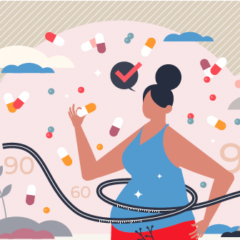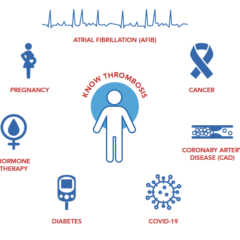Published on
Diabetes and Heart Health
Taking Care of Your Heart by Taking Care of Your Diabetes
In this edition of Patient Pulse, we’re pleased to welcome Dr. Elizabeth Halprin for a discussion on diabetes and heart health. Dr. Halprin is an adult endocrinologist, and her specialty is diabetes. She has a particular interest in diabetes and overall health in underserved populations. She is the Chief of Adult Diabetes at Joslin Diabetes Center in Boston, MA, where she has been practicing for 22 years.
In the webinar, Dr. Halprin addresses:
- The relationship between heart disease and diabetes
- Why diabetes is a risk factor for a cardiovascular event (such as a heart attack, stroke, or blood clot)
- What you can do to manage your diabetes if you’ve had a cardiovascular event
Key takeaways:
- Lifestyle is essential to managing diabetes – eat well, get some activity, watch your blood sugar, reduce stress, and get enough sleep!
- Set some goals to stay on track, but start small and slow when making changes
- No matter what you do to improve your diabetes, it will automatically be good for your heart, too
Full Video Transcript
Hello, everyone, and welcome to another episode of NATF’s Patient Pulse. In keeping with the theme of our Patient Pulse’s from the last couple of months, we’ll be continuing conversations about improving your heart health overall. Today we’d like to welcome Dr. Elizabeth Halprin for a discussion about diabetes and heart health – specifically about how taking care of your diabetes can help you take care of your heart overall, if you do have diabetes.
Dr. Halprin is an adult endocrinologist, and her specialty is diabetes. She has a particular interest in diabetes and overall health in underserved populations. She’s the Chief of Adult Diabetes at Joslin Diabetes Center in Boston, Massachusetts, and she’s been practicing there for 22 years. Thank you so much for joining us today, Dr. Halprin. Please take it away.
Elizabeth Halprin, MD: Thank you so much for inviting me. I’m going to tell you everything you need to know about diabetes in 10 minutes. It’s not a small chore!
The objectives for my talk will be to understand the relationship between cardiovascular disease and diabetes and describe why diabetes is a risk factor for a cardiovascular event – and also to help you learn what you need to do to manage your diabetes after an event, which is a very important time.
Why is diabetes an increased risk for a cardiovascular event? You should know that if you do have diabetes, you’re about two times more likely to have a heart attack or stroke. This is because diabetes can damage your blood vessels, and many people with diabetes also have high blood pressure and high cholesterol.
The other thing about diabetes is the better controlled it is, the lower your risk of any complications of diabetes. So, you can avoid some of these events—or future events, repeat events—by keeping your diabetes under control.
Atherosclerosis is when the blood vessels stiffen and narrow due to fatty plaques. So when this is in your heart, this will lead to decreased oxygen, which will cause a heart attack. And if this is in your legs, this may lead to peripheral artery disease or thrombosis (blood clots). And when it’s in your brain, it may cause a stroke.
Here you can see when the diabetes contributes to this collection of fatty plaques in the arteries. You can see on the left that all of these little M&M like things, which are your red blood cells, will pass through easily. And when there’s plaque in the arteries, then they have a much harder time, and they tend to get sticky.
So, how do you decrease your risk of heart disease? We talk about the ABCs. Now you’ve already heard about the Bs and the Cs, namely the blood pressure and the cholesterol. And my job is to talk about the diabetes, which is represented by the A1C, the hemoglobin A1C.
The A1C is a test that represents your average blood sugar level over the past three months. That’s because it’s a measure of the sugar in your blood that’s glommed onto your red blood cell, which lasts about three months. So, that’s how it manages to be a representation of your overall glucose control. For most people, that number should be about under 7, as long as you can get there without having severe hypoglycemia (low blood sugar). If you have a lot of low blood sugars and a lot of high blood sugars, you’ll have a good average, but it won’t necessarily be ideal, as you won’t feel well, and it’s very risky to have that kind of hypoglycemia or low blood sugar.
The older we get and the frailer we get, the much more severe a hypoglycemic event can be. And after a cardiac event, or for anyone with ischemic heart disease, low blood sugars are dangerous. So, you want to know what your particular A1C goal is, and it may be under 7, it may be somewhere closer to 8. It’s not usually above 8 or 8.5.
The silver lining though is that any one thing you do will be helpful to the other things. So, you can see here that a healthy heart and brain can be helped by all of these factors, and all of these factors intertwine. So, for instance, if you limit your fat and your carbohydrates and added sugars in your diet, that will not only help you lose weight, it will help keep your blood sugars down. If you increase your physical activity, that will also help you lose weight, and it will keep your blood sugars down.
If you manage stress, believe it or not, that will lower your blood sugars, and it may help you lose weight. And then quitting smoking, of course, is also very beneficial for a healthy heart and brain. (The combination of smoking and diabetes is much worse than either of those two things alone.)
Let’s talk about weight loss for a second. Losing just 5 to 10% of your weight will improve your blood sugars greatly. So, the point here is that you don’t have to think I’m going to lose 50 pounds in the next five weeks. So, for example, if you weigh 200 pounds, 5% of that would just be 10 pounds, and you should do that over several months. It should be gradual so that you can maintain that.
Decreasing the amount and type of carbohydrates in your diet will also help you lose weight faster and in a more healthy way. The white carbohydrates are the things we pay a lot of attention to, such as white potatoes, white breads, white pastas, and rice. And, of course, avoid things such as sodas (and juices really are not much better than soda), sweets and candy and things like that should definitely be avoided.
There are certain foods that you may not know are just making your blood sugar go way up, and it’s good to monitor your blood sugars after certain foods to see what the effect is, because that will give you an indication of perhaps what you should avoid.
And we certainly don’t eat enough vegetables as a population. As you can see here, on the Harvard School of Public Health Healthy Eating Plate, vegetables really should occupy, together with fruits, about half of your plate. Whole grains, such as whole wheat pasta or brown rice should occupy just a quarter of your plate.
Healthy protein such as fish and poultry, beans, and nuts can occupy another quarter of your plate. Of course, you’re going to use healthy oils and drink plenty of water. And stay away, as I said before, from sodas and juices and even things with a lot of artificial sweeteners.
With physical activity, you should start slow. You don’t want to run a marathon within a couple of weeks. You want to make it possible to fit into your day and make it every day. Because if you make it every other day, pretty soon every other day will be today. So, try to do a little bit every day. And you want to make sure that you enjoy it. You know, you could walk up and down the stairs doing laundry, which a lot of my patients tell me is their exercise, but that’s not so good for the soul. You really want to have fun doing it. As you’re exercising, you want to focus on balance, strength, and your heart rate as well.
Stress, as hard as it may be to believe, also affects your blood sugar directly. So, we really need to work on things that decrease the amount of stress we have or help us manage the stress that’s in all of our lives right now. Getting a good night’s sleep is important and physical activity, again, is very important.
Now, medications are also very important. Lifestyle is huge for the control of diabetes, but there are lots of good medications nowadays that have secondary effects of improving your heart disease and congestive heart failure, and some even protect your kidneys. In addition to lowering your blood glucose levels and helping with weight loss, they are really a great bunch of medications; you should discuss with your team to see if you would be a good candidate for them.
So, the key points here today are to set some goals but make them obtainable to will keep you on track and not be frustrating for you. Start small and remember that no matter what you do to improve your diabetes, it will be good for your heart, as well. Any little bit will be good for both!
Start slowly so that you can keep it incorporated into your life and sustain it for the rest of your life.
Thank you very much.

